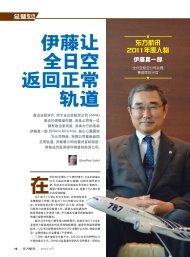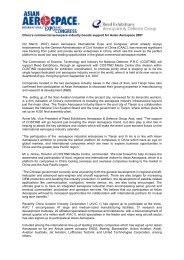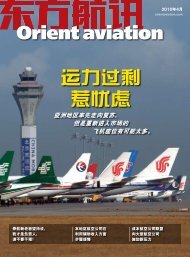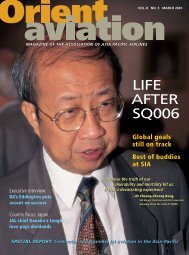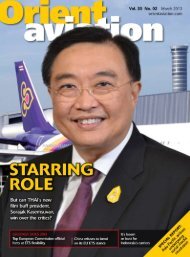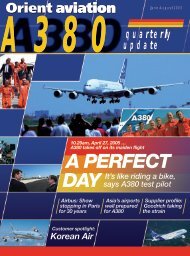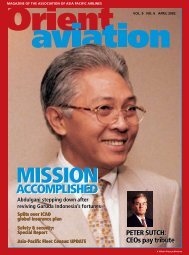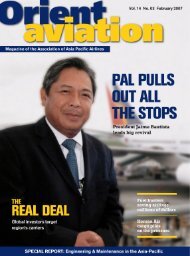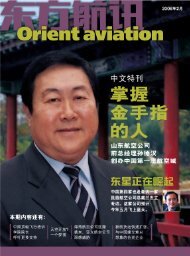You also want an ePaper? Increase the reach of your titles
YUMPU automatically turns print PDFs into web optimized ePapers that Google loves.
the country was finally getting it right, saidBehnke.“India seems to have the right philosophy,it is just a little behind on implementation. ButChina seems slow to embrace liberalisation,”he said.IATA’s Matschnigg also homes in onChina and India as causes for concern.With China’s annual traffic growthin double digits, there is a need forinfrastructure that can cope with demand,alongside route improvements and new airtraffic control technology. Or the systemwill clog up.“Those things need to come urgently,” hesaid. “We are already seeing rising numbersof delays in Shanghai and Beijing. In twoyears we have the Olympics.“If we do not get our act together withthe government, we foresee some difficultiesthere.”Matschnigg also pointed to areas awayfrom the Beijing and Shanghai hubs whereimprovements were needed, such as easingthe complexities of air traffic control in thePearl River Delta region which mean trafficinto Hong Kong can pass through a numberof different regimes in southern China beforean aircraft can land.It comes down to economics, as well asconvenience.“Today, the fuel price is US$67 a barrel.We need to look at each and every way we canreduce flight times; better procedures, betterarrivals, better departures,” he said.There are air space issues in India as well,according to Matschnigg, but the country ison the right track, he said. “It’s more theairports and ground infrastructure that is anarea of concern. The airlines are explodingwith new aircraft. There is an urgent need torebuild, extend.”Elsewhere, the IATA official highlightedAustralia, New Zealand and Singapore ascountries where relationships are strongand progress good. Even Indonesia, with its24 airports classified as “international” anda doubling of passengers in the two years to2004, does not appear to give him sleeplessnights.Like Southeast Asia, where low-costcarriers and new airlines in general arearriving at a fast clip, this is not an area ofconcern, rather one to watch out for, he said.Indo-China is also seeing huge growth, butMatschnigg believes it is well-managed,especially in Vietnam’s case.Matschnigg used the case of Bangkok’snew Suvarnabhumi International <strong>Air</strong>port asan example of input from the industry havingan effect on authorities. The facility’s officialopening scheduled for last September waspostponed until mid-2006, but another delaynow looks likely.“We told the government two years agothat if they opened as planned, they wouldend up in a mess,” he said.“The good thing is they listened. We gotour point across.”Incheon topplesHong Kongin world’s bestairports pollIncheon <strong>Air</strong>port: clinched top airport andmost improved airport awardsThe names may be in a differentorder, but Asia’s sparkling newfacilities have again swept theboard in the AETRA annualsurvey of customer satisfactionat the world’s airports.In 2004, Hong Kong, Seoul Incheonand Singapore Changi took the first threeslots for “best airport worldwide” based onsome 65,000 interviews at 40 participatingfacilities in an exercise run by individualairports themselves under the auspices of<strong>Air</strong>ports Council International (ACI) andthe International <strong>Air</strong> Transport Association(IATA). AETRA then processed the results.For 2005, Incheon leapfrogged HongKong into first place, leaving Singaporeand Hong Kong as joint runners-up. KualaLumpur took third place.Incheon, Vancouver and Singapore filledthe first three slots in the “most improvedcategory”.When it came to traffic volume, Nagoyaand Christchurch were named first andsecond in the five million to 15 millionpassenger category and Kuala Lumpurpushed Dubai into second place by winningthe 15 million to 25 million sector.This time 100,000 questionnaires werecompleted at 66 airports worldwide duringall four quarters of the year. Feedback wasgauged at each step of the airport processfrom arrival to final boarding. <strong>Air</strong>portfacilities were also graded. The idea is to giveairports a benchmark for improvements aswell as to name the high flyers. Awards wereannounced at ACI’s airport service qualityconference in Abu Dhabi.The survey will be the last under theAETRA name – it comes from the Greek for“upper air, clear sky”. Seventy-three airportsare now taking part in its successor, the<strong>Air</strong>port Service Quality (ASQ) programme,run as an ACI initiative alone. ACI expectsthat number to increase to 100 by the end ofthe year.MAY 2006 ORIENT AVIATION 51



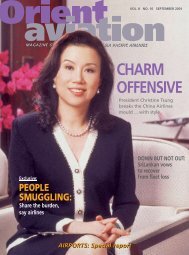
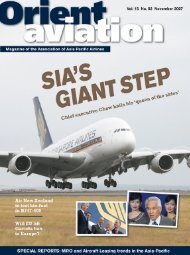
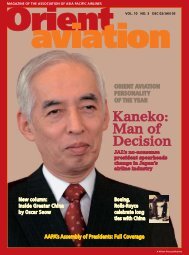
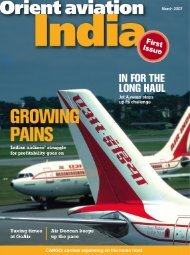
![OAMag-V7N4-Cover [Converted] - Orient Aviation](https://img.yumpu.com/48598575/1/190x255/oamag-v7n4-cover-converted-orient-aviation.jpg?quality=85)
